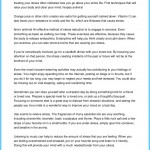Resolve past hurts and become the person you really are.
Ever wished you had more influence over your thoughts? Whether it’s a racing mind keeping you awake at night or an internal dialogue distracting you from the task at hand, sometimes it feels as if your thoughts control you rather than the other way around. So, wouldn’t it be great if you could take charge of your mind? Actually you can, just not in the way you think. ‘The mind can never be controlled,’ explains spiritual giant Byron Katie in her new book A Mind at Home with Itself (Rider Books, £12.99).
How to Clear Your Mind to Reduce Stress Photo Gallery
‘It can only be questioned, loved and met with understanding.’ This is great news. Not just for those struggling to empty their mind when they meditate, but for anyone who ever argued with their best friend, can’t stop thinking about their ex or is forever making plans that rarely come to fruition. MAKE YOUR PEACE As a long-time meditator and yoga teacher, I’ve learned that, until you find peace with past conflicts, you’ll never be free of the energy they hold over you; energy that often finds form in incessant thoughts or feelings.
What’s more, these unresolved issues continue to influence your life in ways you don’t even realise: a past argument can make you overly cautious in all your relationships; not letting go of an ex can lead you to subconciously sabotage any burgeoning romances. To help people heal these difficult — but all too human — emotions, Katie developed ‘The Work’, an in-depth technique for unravelling the complex threads of a highly charged emotional difficulty. Rather than using a cognitive, left-brain approach, she suggests you come to The Work in a soft, relaxed manner; connect to your breath, become still and allow insights to come to you, so you can bypass conscious thought and gain a more intuitive understanding of the situation you’re working with.
THE GROUNDWORK Choose an unresolved emotional difficulty and ask yourself what you feel and why? For example, you may be hurt because you feel a friend is using you, or perhaps you’re angry with a colleague for not pulling their weight. When you’re satisfied you’ve fully explored your feelings, one by one, move onto the remaining questions: u What do you think about this person in this situation, and how would you like them to change? u What advice would you offer them? u For you to be happy, what would you need them to feel or do?
What is it about this situation you don’t want to experience again? DIGGING DEEPER This process is valuable in itself, but Katie encourages you to go further, questioning if what you think is really true and the impact on your life of believing it. Initially, the technique bears some resemblance to cognitive behaviour therapy (Is the statement true? Do you have evidence to prove it’s true?
What would a balanced view look like?), but The Work goes far deeper. Not only does it ask you to consider how you behave when you believe your thoughts are true, the jewel in her method asks ‘Who would you be without that thought?’ Not how would you feel or what would you do, but who would you be? It’s worth really taking time with this technique as it has so many benefits, from understanding your needs to learning how to honour and protect yourself in the future. It teaches you to find and set your boundaries and, ultimately, learn not to identify with, or be defined by, someone else’s perception or treatment of you. Instead of being controlled by your mind, you’re inquiring into what it holds, and meeting it — and yourself — with love.








